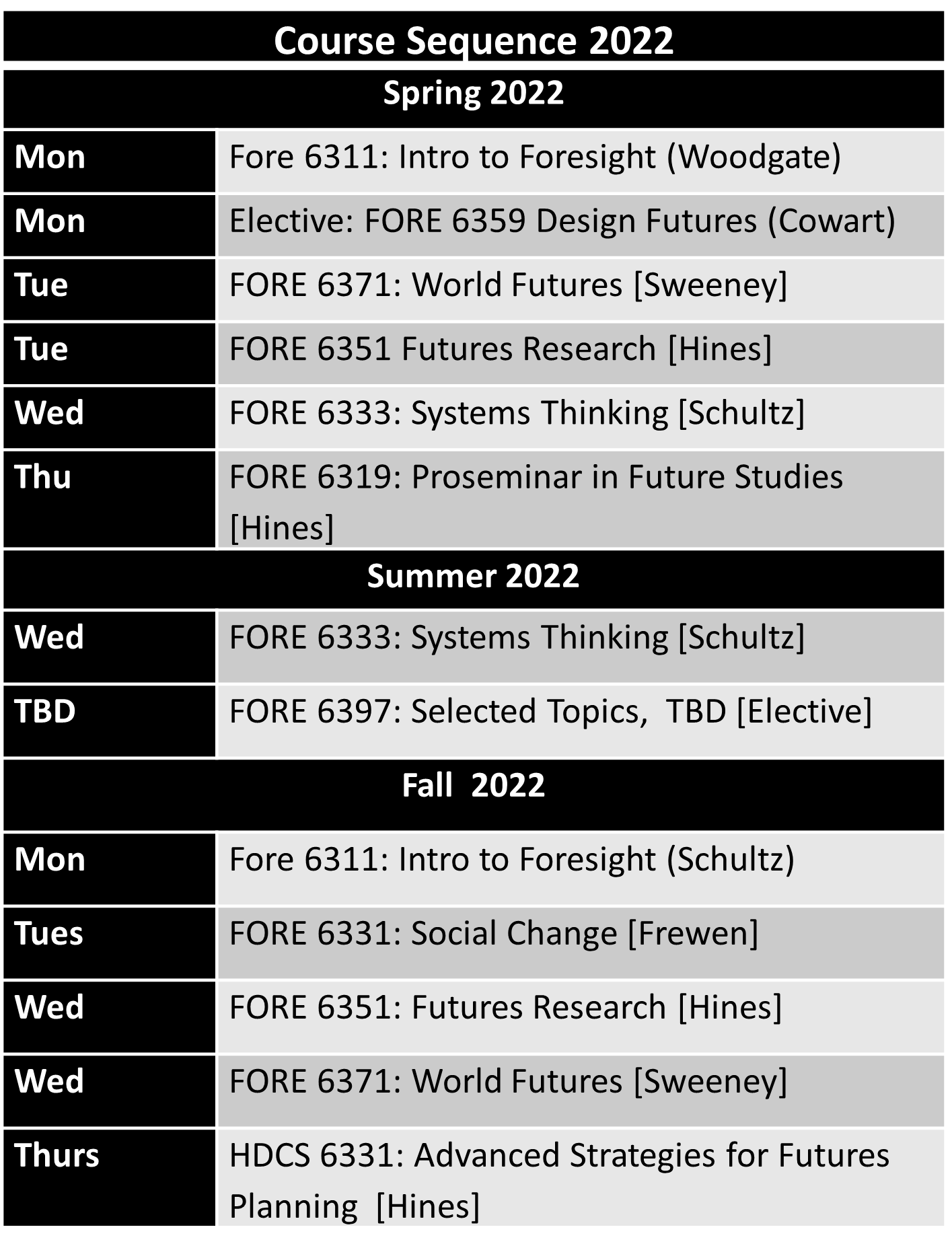Courses
Below is information about the courses in each of our degree tracks. To learn more about the sequence of courses for the following academic year or information about the different course types please contact us at foresight@uh.edu
Level 1 – Overview
Introduction to Foresight – a survey of the foresight field, including its theories, methods, history, and current structure. Syllabus
Level 2 – Theory
Social Change – a critical review of classical and contemporary theories of social change, emphasizing the assumptions and applications of each. Syllabus
Systems Thinking – a review of the classical cybernetic systems view and the emerging complex adaptive view in order to see trends and events in the world as the product of a pre-existing system structure. Syllabus
Level 3 – Methods
Futures Research – introduction to and practice in the tools and techniques used in forecasting (including secondary research, interviews and questionnaire and trend extrapolation), for identifying the most likely and expected future as well as alternative futures (aka Scenarios). Syllabus; Schedule
Advanced Strategies – introduction to and practice in the tools and techniques for organizing people and resources to create transformational change and the techniques for creating such change. Syllabus; Schedule
Alternative Perspectives (elective)- a review of “different” perspectives, concepts, and methods for approaching the future and a critical review of assumptions and archetypes hidden from routine analysis. Syllabus; Schedule
Design Futures (elective) – Design futures combines futures thinking with design thinking in order to create tangible futures scenarios by learning through intellectual and practical “in use” approaches. Syllabus
Level 4 – Content & Electives
World Futures – a review of the major trends and issues in the world today that are shaping the future of tomorrow. Syllabus; Schedule
[Summer] Electives FORE 6397 – Each summer, we offer different courses on current foresight topics that motivate interested students. We are open to topics that students have an interest in exploring.
Listed below are classes that were offered in the past few years. Explore a few to get an idea as to the range of topics that are covered and to see which ones might interested you:
Re-Storying Futures, Adam Cowart
Gaming Futures. John Sweeney
Communicating the Future, Laura Schlehuber
Science Fiction as Foresight, Tim Morgan
Data Mining, Anne Boysen
Building Capacity for Transformation, Cecily Sommers
Design Futures, Cindy Frewen (now a regular elective)
Images of the Future, Wendy Schultz
Technology Acceleration, John Smart
Technology Forecasting, Peter Bishop
Women as Builders of the Future, Terry Grim
Future of Biotechnology Peter Bishop
Future of Climate Change, Peter Bishop
And some recommended electives for non-majors who wish to try some foresight courses.
Level 5 – Capstone
Proseminar in Foresight – a final review of the foresight field, practice in professional skills (such as writing, presentation, consulting and training), and preparation for professional practice. Syllabus
Level 6 – Master’s Option
Choose one of the following:
Thesis – academic research based on empirical evidence that makes a contribution to foresight theory or methodology, resulting in a thesis and a optional publishable article.
Project – professional foresight research (forecast, plan, etc.) for a designated client demonstrating a range of professional skills and techniques.
Internship – work with a professional futurist on a broad range of projects over ten or more weeks (around 150 clock hours), resulting in a report of activities and learning.
Note – Courses may be taken in any order, except that the Introduction to Foresight should be taken as early as possible and the Proseminar in Foresight should be taken toward the end of the program. In addition, students are expected to identify two electives outside the futures studies program, also taken late in the program and generally in a domain of the student’s interest and foresight practice, such as business, education, government, etc.

Past Electives Taught by Foresight Faculty
- Data Mining
- Building Capacity for Transformation
- Design Futures
- Images of the Future
- Technology Acceleration
- Technology Forecasting
- Women as Builders of the Future
- Future of Biotechnology
- Future of Climate Change